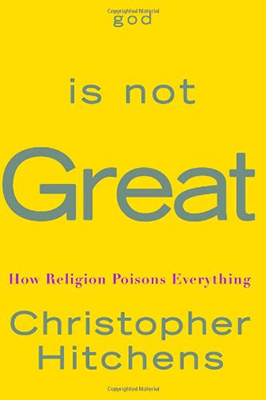God Is Not Great
“God Is Not Great: How Religion Poisons Everything” is a provocative book by journalist and author Christopher Hitchens, published in 2007. In it, Hitchens presents a scathing critique of organized religion, arguing that it has had a detrimental impact on human society throughout history. Here’s a summary:
Main Thesis:
Hitchens asserts that religion is not only false but also harmful, asserting that it has been a source of division, oppression, violence, and ignorance throughout human history. He contends that religious beliefs have hindered scientific progress, fueled conflicts, and perpetuated irrationality and superstition.
Key Arguments:
Religion and Morality: Hitchens challenges the notion that religion is necessary for morality, arguing that ethical principles can be derived from secular sources such as reason, empathy, and humanistic values. He criticizes religious moral codes as arbitrary and often contradictory.
The Harm of Faith: Hitchens highlights numerous examples of the harm caused by religious beliefs, including wars, persecution of minorities, suppression of scientific inquiry, and the subjugation of women and LGBTQ+ individuals. He argues that faith encourages people to accept unsubstantiated claims without evidence, fostering intellectual laziness and credulity.
Religious Dogma and Authoritarianism: Hitchens condemns the authoritarian nature of many religious institutions, which seek to control people’s thoughts, behaviors, and freedoms through dogma, censorship, and coercion. He warns against the dangers of religious extremism and theocracy, citing examples from history and contemporary society.
The Case Against God: Hitchens presents arguments against the existence of God, challenging theological claims and philosophical justifications for belief. He critiques religious apologetics and asserts that the burden of proof lies with those making extraordinary claims about the divine.
Responses to Criticisms:
– Freedom of Religion: Hitchens acknowledges the importance of freedom of religion but argues that it should not shield religious beliefs from criticism or exempt them from rational scrutiny.
– Cultural Contributions of Religion: While acknowledging the cultural contributions of religion, Hitchens contends that they do not outweigh the harm caused by religious beliefs and institutions.
Impact:
“God Is Not Great” sparked widespread debate and controversy upon its release, with proponents and critics engaging in spirited discussions about the role of religion in society. While some praised Hitchens for his bold critique of faith, others criticized him for what they saw as an overly broad and one-sided portrayal of religion. Regardless of one’s stance, the book remains a thought-provoking exploration of the relationship between religion, morality, and human civilization.

